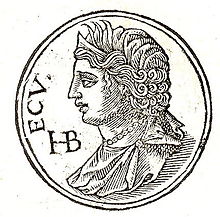Hecuba
This article needs additional citations for verification. (December 2010) |

- This page is about the mythological figure; for other uses, see Hecuba (disambiguation)

The death of Hector on a Roman sarcophagus, c. 200 AD
Hecuba (also Hekábe, Hecabe, Hécube; Ancient Greek: Ἑκάβη) was a queen in Greek mythology, the wife of King Priam of Troy, with whom she had 19 children.[1] The most famous son was Hector of Troy. Her most famous daughter was Cassandra, priestess of Apollo. According to Suetonius Tranquillus’s Lives of the Caesar’s [Tiberius LXX] ‘Who is Hecabe’s mother?’ is the most vexatious of Tiberius's enigmatic questions. According to Homer, (Iliad, XVI 715) Hecuba was of Phrygian birth; her father was Dymas, and her mother Eunoë was said to be a daughter of Sangarius, god of the Sangarius River, the principal river of ancient Phrygia.
Hecuba in literature
In the Iliad, Hecuba appears as the mother of Hector, lamenting his death in a well-known speech in Book 24 of the epic. She has several smaller appearances in the poem; in Book 6, under Hector's advice, she leads the Trojan women to the temple of Athena to pray for help. In Book 22, she pleads with Hector not to fight Achilles, for fear of "never get[ting] to mourn you laid out on a bier.".[2]
According to Apollodorus' "Library", Hecuba had a son named Troilus with the god Apollo. An oracle prophesied that Troy would not be defeated as long as Troilus reached the age of twenty alive. He was killed by Achilles during the Trojan War.
Polydorus, Priam's youngest son by Hecuba, was sent with gifts of jewelry and gold to the court of King Polymestor to keep him safe during the Trojan War. The fighting grew vicious and Priam was frightened for the child's safety. After Troy fell, Polymestor threw Polydorus to his death to take the treasure for himself. Hecuba though, was enslaved by the Achaeans when the city fell and eventually avenged her son, blinding Polymestor and killing his children. These actions are shown in Euripides' play "Hecuba".
In another tradition, Hecuba went insane upon seeing the corpses of her children Polydorus and Polyxena. Dante described this episode, which he derived from Italian sources:
|
|
~ Inferno XXX: 13-20
A third story says that she was given to Odysseus as a slave, but as she snarled and cursed at him, the gods turned her into a dog, allowing her to escape.
Hecuba's children with Priam
see also List of King Priam's children
- Antiphus
- Cassandra
- Creusa
- Deiphobus
- Hector
- Helenus
- Hipponous
- Laodice
- Pammon
- Paris
- Polites
- Polydorus
- Polyxena
Hecuba in Music
Hecuba is mentioned in the piece "Fortune Plango Vulnera" from Carl Orffs' "Carmina Burana" in the line:
"Nam sub axe legimus Hecubam reginam", literally, " for under the axis we read Queen Hecuba"
Hecuba in arts and literature
- Central character of the plays Hecuba and The Trojan Women by Euripides
- Character in King Priam by David Park (1958–61)
- Referenced in Critique of Pure Reason by Immanuel Kant
- Mentioned in "Fortune plango vulnera" of Carmina Burana
- Mentioned as part of the 'Troy scene' in William Shakespeare's poem "The Rape of Lucrece"
- Mentioned in Act II Scene 2 of Hamlet by William Shakespeare
- Mentioned in Act IV Scene 2 of Cymbeline by William Shakespeare
- Central character of Cortege of Eagles by Martha Graham (1967)
- Character in the play The Trojan War Will Not Take Place, by Jean Giraudoux
- Name of cat in Drag Me to Hell
- The chief antagonist in the video game Nox is named Hecubah
- Harold Hecuba (played by Phil Silvers), a character in the Gilligan's Island episode, "The Producer."
References
- ^ http://encyclopedia.farlex.com/Hekuba
- '^ Homer The Iliad. Line 86
Primary sources
- Virgil, Aeneid III.19-68
- Homer, Iliad XIV.717-718
- Solinus, De vita Caesarum X.22
- Lactantius, Divinae institutions I.22
- Pomponius Mela, De chorographia II.26
- Ovid, Metamorphoses XIII.423-450, 481-571
- Euripides, "Trojan Women"
- Euripides, "Hecuba"
Secondary sources
- Tsotakou-Karveli. Lexicon of Greek Mythology. Athens: Sokoli, 1990.

